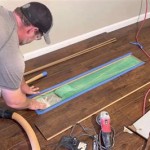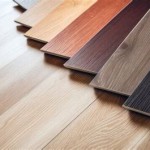How to Seal Wood Subfloor: A Comprehensive Guide
Sealing a wood subfloor is a crucial step in protecting it from moisture, rot, and other damage. Whether you're installing new flooring or repairing an existing one, this guide will provide you with step-by-step instructions on how to seal your wood subfloor effectively.
1. Preparatory Steps
Before applying any sealant, it's essential to prepare your subfloor:
Clean the subfloor: Remove dirt, debris, and any old adhesive residue using a broom or vacuum cleaner.
Check for moisture: Use a moisture meter to ensure that the subfloor is dry and has a moisture content below 12%. High moisture levels can compromise the adhesion of the sealant.
Inspect for damage: Examine the subfloor for any cracks, gaps, or damaged areas. Repair these imperfections with wood filler or adhesive before sealing.
2. Choose the Right Sealant
The type of sealant you select depends on the specific needs of your project:
Oil-based sealants: Penetrate deep into the wood, providing excellent protection against moisture and wear.
Water-based sealants: Form a protective coating on the surface of the wood, offering moisture resistance and increased durability.
Epoxy sealants: Provide the highest level of protection, creating a waterproof and chemically resistant barrier.
3. Application Techniques
Follow these steps when applying sealant to your subfloor:
Use a roller or brush: Apply the sealant evenly in thin, even coats.
Allow for drying time: Follow the manufacturer's instructions for the drying time between coats.
Apply multiple coats: Apply 2-3 coats of sealant for optimal protection.
Sand between coats: Lightly sand each coat with fine-grit sandpaper to smooth the surface and enhance adhesion.
4. Additional Considerations
Keep these factors in mind when sealing your subfloor:
Ventilation: Ensure adequate ventilation during application and drying to prevent fumes from accumulating.
Protect adjacent surfaces: Apply painter's tape or plastic sheeting around edges and fixtures to prevent sealant from staining other surfaces.
Final inspection: Once the sealant is completely dry, inspect the floor for any missed areas or imperfections and apply additional sealant as needed.
By following these steps and considering the additional factors, you can effectively seal your wood subfloor, providing long-lasting protection and ensuring the durability of your flooring.

How To Use Seal Spray Foam Sub Floor And Construction Adhesive


My Steps For Successful Prep Over A Wood Subfloor Floor Business

9 Essential Tips To Avoid Common Subfloor Mistakes

How To Patch Subfloor Sawdust Girl

Subflooring Secrets To A Quiet Floor Subfloor Construction

How To Paint A Plywood Floor The Easy Way Semigloss Design

Amazing Painted Plywood Subfloor A How To

How To Use Seal Spray Foam Sub Floor And Construction Adhesive

How To Level A Floor With Self Leveling Compound

















